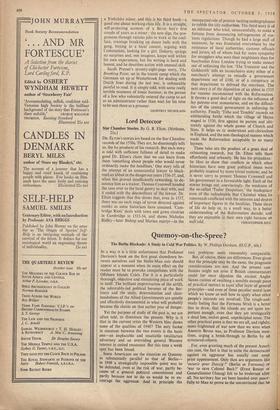Lord Detector
Star Chamber Stories. By G. R. Elton. (Methuen, 21s.) DR. ELTON'S stories are based on the Star Chamber records of the 1530s. They are, he disarmingly tells us, the by-products of his research. But each story is told with sufficient fullness of detail to make good Dr. Elton's claim that we can learn from them 'something about people who would never ordinarily make the headlines.' One story tells of the attempt of an unsuccessful lawyer to black- mail an abbot in the dangerous years 1536-37, and, when this proved insufficiently rewarding, to de- nounce him as a traitor. Thomas Cromwell handed the case over to the local gentry to deal with, and it ended ,with the discomfiture of the lawyer. Dr. Elton suggests that this shows that, even in 1537, there was no such reign of terror directed against monks as some historians have assumed. 'Cam- bridge Riots' deals with town and gown rivalries in Cambridge in 1533-34, and shows Nicholas Ridley—later Bishop and Marian martyr—in the unexpected role of proctor inciting undergraduates to rabble the city authorities. The third story is of an informer who tried, unsuccessfully, to make a fortune from denouncing infringements of cus- toms regulations. Though he had a large staff of assistants, he was frustrated everywhere by the resistance of local authorities, customs officials and jurors, all of whom had far more sympathy for smugglers who were their neighbours than for busybodies from London trying to make money out of enforcing the law. 'The Treasurer and the Goldsmith' tells an inconclusive story either of a merchant's attempt to swindle a government department out of £100, or of a conspiracy in that department to defraud the merchant. The next story is of the deposition of an abbot in 1533 for reasons unconnected with the Reformation. It throws a good deal of light on the influence of lay patrons over monasteries, and on the difficul- ties of the central government in enforcing its authority. Finally 'Tithe and Trouble' records an exhilarating battle' which the village of Hayes waged in 1530, first against its parson and ulti- mately against the whole power of Church and State. It helps us to understand anti-clericalism in England, and the non-theological reasons which made the Reformation acceptable to so many laymen.
These tales are the product of a great deal of exhausting research, but Dr. Elton tells them effortlessly and urbanely. He has his prejudices : he likes to show that conflicts in which other historians have seep great political issues were probably inspired by more trivial motives; and he is never sorry to present Thomas Cromwell and his government in a favourable light. Each of the stories brings out, convincingly, the weakness of the so-called 'Tudor Despotism,' the inadequacy even of the redoubtable Star Chamber when its commands conflicted with the interests and desires of important figures in the localities. These slices of life do help us, in a small way, to a better understanding of the Reformation decade; and they are enjoyable in their own right because so


















































 Previous page
Previous page